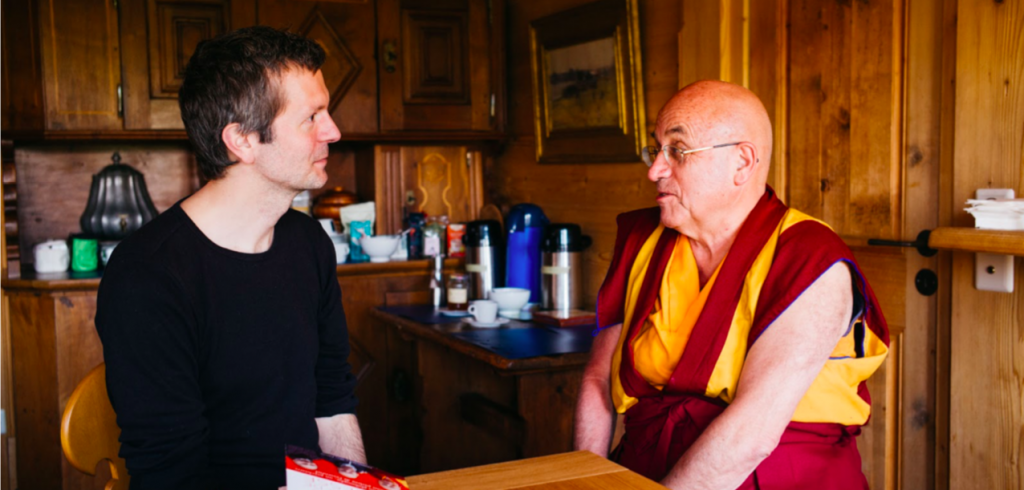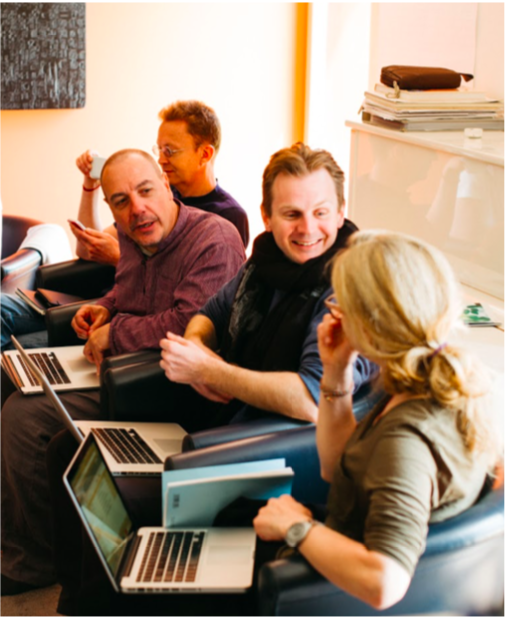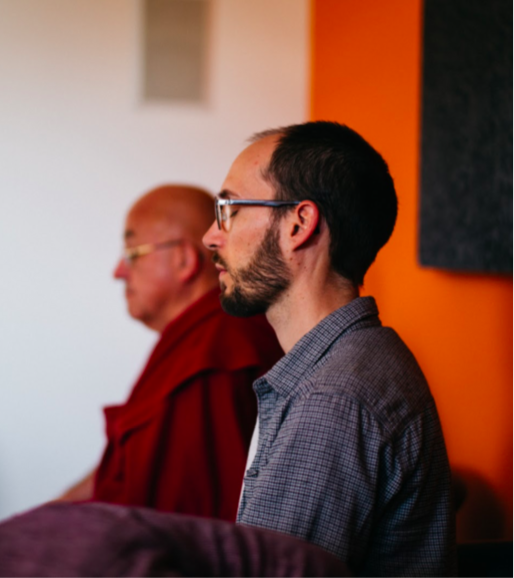In 2016, members of Karuna-Shechen attended a seminar with Frédéric Laloux, author of Reinventing Organizations, who specializes in helping organizations change their structures to reflect their values.Karuna invited Frédéric because they wanted their values to imbue their workplace, as well as increase their performance metrics.There was a desire to find the right balance between the speed of decision-making that pyramidal models permit, and the bond of trust that can be found in horizontal models. This workshop also helped teams find more simplicity, authenticity and meaning in their daily work.
To learn more about the managerial theories of altruism at work, we invite you to a round table discussion between Matthieu Ricard and Frédéric Laloux on 23 February 2021. You can also find resources here.

Karuna-Shechen is an NGO that acts and advocates for a more altruistic world. There are several definitions of altruism, the most common of which is, “the willingness to take an interest in and devote oneself to others”. Based on this principle, as well as the desire to better organize internal work, it seemed essential to create a work environment where altruistic practices could be cultivated on a daily basis. Karuna is, in its own way, a living organism. Taking care of each of our members – from the employee to the donor, from the volunteer to the beneficiary – ensures the sustainability of just action.
An inclusive organisation cultivates everyone’s creativity

The first proposal was to establish an internal structure based on the opal organizational model , outlined in Laloux’s book. This is based on three principles: self-governance, connection and the reduction of the ego.
Based on the principle of self-governance, Karuna is structured into specialized “circles of competence”, – action in the field, communication and fundraising, logistics, etc. Each member can join any circle they wish. The idea is that such an organization stimulates everyone’s creativity, draws its strength from the motivation of its members and empowers them.
This system requires flexibility with regard to the responsibilities and tasks of each person. It also takes advantage of the skills of new arrivals to redistribute the work more efficiently. Catherine, who coordinates the link with the philanthropists, says :
The more time passed, the more I felt fulfilled within Karuna. Using these tools I could sense the empowerment given to everyone, the accountability we each held, and the ability to be fully oneself without wearing a mask.
Karuna’s process is already atypical, in that most projects and strategic decisions are discussed by a larger group. In a traditional structure, decisions are often taken by a small group, or by the manager alone. In Karuna the project leader remains the final decision-maker, but time is set aside to benefit from everyone’s opinions. The support of the group. makes it possible to build more intelligent projects.
Moving from idea to practice – a challenge
Such a transition requires time and buy-in from the teams accustomed to the pre-existing system. “Moving to such a model is difficult. It requires leaders who are willing to set aside their usual “power,” and accept that the team is self-managing. It also needs managers who have the willingness to share their authority”, says Erick, a member of the international board.
It also means a complete change in the way we evaluate our effectiveness, says Catherine. “At some point, a model has to be measured by success. But how do we measure it? Is it the decrease in employee turnover? The enthusiasm of employees and stakeholders? More impact on the ground? Within Karuna we are still evolving. There is a long way to go. We are aware that we can do more and it takes time, intelligence and adaptability.”
Beyond our organizational changes, many new tools emerged from our meetings with Frédéric. Tools that we struggled to integrate into everyone’s daily worklife. “I arrived in Karuna at a time when the tools were already in place but not being used [by all the teams]. This is the difficulty that all organizations have when they carry out a “People’s Change” project that tries to integrate new theoretical tools into everyday work. We all wanted to move towards more benevolence, more connection, but we didn’t really know how to do it while preserving our efficiency and impact,” says Quentin, CEO of the association.
Daily tools to encourage intention, listening and emotional expression
The first tool selected by Karuna members was the practice of a short lay meditation before the start of each meeting. Sometimes just 1 minute of meditative practice before an important topic can make a huge difference in the subsequent discussion. “At first it’s surprising, but after a while it becomes indispensable, especially in Zoom meetings. It helps to “calm everyone down”, says Réjane, a Communication and Fundraising intern. Shalav, our operations manager in Nepal, also says :
Meditation creates a positive atmosphere where everyone pays attention to each other without judgment. The silence is also pleasant and impacts us all deeply. It interrupts the daily hubbub of our busy days.

The short meditation is followed by a round table discussion of one’s “inner weather” : the sharing of each person’s current important news, be it physical or emotional. “Giving clues to your colleagues about how you feel is essential, even more so on Zoom. It helps to keep a connection and to understand people’s reactions,” says Réjane Franck, the director of Le Plaidoyer. He adds: “For a long time now, the company has been seen as a machine and each individual as an interchangeable, replaceable cog. In this old system, we don’t care about people’s emotions. To take an interest in the emotions of our colleagues is to take care of the organism as a whole. It is an illusion to say that work and personal life can be completely separate. As we work with our emotions, let’s create a space to express them. This is the starting point for the inner weather check-ins.”
This tool is practiced by our European teams, as well as by our Asian teams. Shalav tells me, “Employees have gradually taken ownership of this tool. Inner weather is a universal tool that largely transcends differences in language, culture and country.” Quentin adds, “Some people will think that these tools are a waste of time. However, we develop an authentic connection, and a mutual understanding that helps us work better together. It allows a collective creativity unfiltered by judgment.”
Creating links and strengthening the development of each person, despite the distance
The way Karuna operates is not perfect. However, it has enabled us to cultivate a culture of benevolence and trust that is essential. Quentin, who became CEO of the association in 2019, recalls :
When I took up my post a little over a year ago, I felt great kindness from all the teams. This allowed me to find my rightful place as CEO, without having the impression of being constantly evaluated or judged.
This new work organization has become even more important since the start of the pandemic, which has forced us to work remotely. Franck says: “Teleworking increases the importance of caring, of being interested in others. We feel emotions less through a screen: that’s why sharing “inner weather” is even more essential.”

Karuna functions a bit like a tree: it is rooted in secular Buddhist values and radiates with its branches. And when one branch is dying, the whole organism suffers.
An organisation is really a living thing: it must always be looked after with compassion. The only constant in the end is change.”
Erick, board member.
